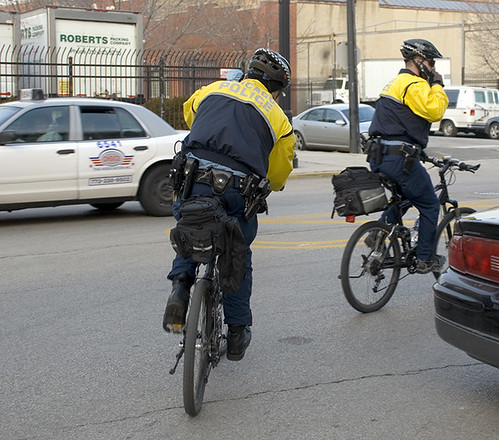Wait, I thought Rudy G was no longer in charge of NYC. I guess some of his cronies are still left behind, running the NYC Police Dept.
Congress shall make no law respecting an establishment of religion, or prohibiting the free exercise thereof; or abridging the freedom of speech, or of the press; or the right of the people peaceably to assemble, and to petition the Government for a redress of grievances.
NYC man held for reciting 1st Amendment - Yahoo! News: ... [Reverend Billy, whose real name is Bill Talen] latest run-in with the law began after he turned up to support people gathering in Union Square last Friday for the monthly Critical Mass bike ride asserting cyclists' rights.The NYPD has aggressively policed the rides, arguing that they can interfere with traffic and threaten public safety. Advocates for Critical Mass have accused police of infringing on the riders' constitutional rights to free speech and free assembly.
The video shows Talen preaching the “44 beautiful words of the First Amendment” to a visibly annoyed congregation of police commanders huddled a few feet away. At one point, an officer approaches and warns him that his sermon is breaking the law.
“What's the law?” Talen asks.
“Harassment,” the officer answers.
When Talen persists, another officer comes up behind him and slaps on handcuffs. When being put in a police van, the satirist shouts, “We have a right to peaceful assembly!”
Talen was held overnight before being released without bail. A criminal complaint alleges he harassed police officers by approaching them and “repeatedly shouting at such officers through a non-electric bullhorn.”
Amazing really, how much this Amendment's scope has been contracted, just in my lifetime. Ironically, the conservative wing of the judiciary often mouths words about respecting the Founding Fathers' intent. Ha. Free Speech zones at political events, cops restricting Critical Mass rallies, investigations of Quaker anti-war groups, the list goes on and on.
from the wiki entry on this phenomenon of our eroding rights:
After World War I, several cases involving laws limiting speech came before the Supreme Court. The Espionage Act of 1917 imposed a maximum sentence of twenty years for anyone who caused or attempted to cause “insubordination, disloyalty, mutiny, or refusal of duty in the military or naval forces of the United States.” Under the Act, over two thousand prosecutions were commenced. For instance, one filmmaker was sentenced to ten years imprisonment because his portrayal of British soldiers in a movie about the American Revolution impugned the good faith of an American ally, the United Kingdom. The Sedition Act of 1918 went even further, criminalizing “disloyal,” “scurrilous” or “abusive” language against the government.The Supreme Court was first requested to strike down a law violating the free speech clause in 1919. The case involved Charles Schenck, who had during the war published leaflets challenging the conscription system then in effect. The Supreme Court unanimously upheld Schenck's conviction for violating the Espionage Act when it decided Schenck v. United States, 249 U.S. 47 (1919). Justice Oliver Wendell Holmes, Jr., writing for the Court, suggested that “the question in every case is whether the words used are in such circumstances and are of such a nature as to create a clear and present danger that they will bring about the substantive evils that Congress has a right to prevent.”
The “clear and present danger” test of Schenck was extended in Debs v. United States, 249 U.S. 211 (1919), again by Justice Oliver Wendell Holmes. The case involved a speech made by Eugene V. Debs, a political activist. Debs had not spoken any words that posed a “clear and present danger” to the conscription system, but a speech in which he denounced militarism was nonetheless found to be sufficient grounds for his conviction. Justice Holmes suggested that the speech had a “natural tendency” to occlude the draft.
Thus, the Supreme Court effectively shaped the First Amendment in such a manner as to permit a multitude of restrictions on speech. Further restrictions on speech were accepted by the Supreme Court when it decided Gitlow v. New York, 268 U.S. 652 (1925). Writing for the majority, Justice Edward Sanford suggested that states could punish words that “by their very nature, involve danger to the public peace and to the security of the state.” Lawmakers were given the freedom to decide which speech would constitute a danger.
Technorati Tags: bicycle, bike, free_speech, police, Critical_Mass

